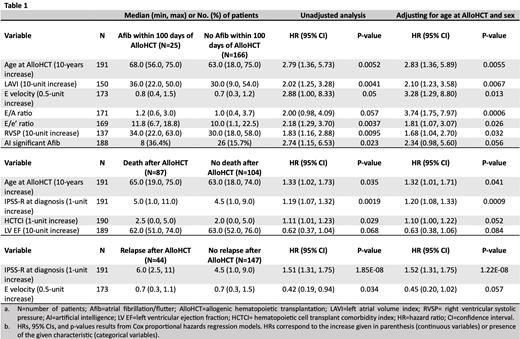Introduction
Atrial fibrillation/flutter (Afib) contributes independently to the hematopoietic cell transplant comorbidity index (HCTCI) and is a known complication of allogeneic hematopoietic transplantation (AlloHCT) which has been linked to inferior outcomes, particularly in older patients. An electrocardiogram (ECG)-based artificial intelligence (AI) algorithm to predict Afib and cardiac contractile dysfunction risk has been validated (Lancet 394:861, 2019). We hypothesized that assessment of pre-transplant Afib risk using the AI algorithm may predict future development of Afib and help identify patients at higher risk for this complication.
Methods
191 consecutive MDS patients undergoing AlloHCT with curative intent using myeloablative (28.3%) or reduced intensity conditioning (62.3%) in the Mayo Clinic Comprehensive Cancer Center (Rochester, Jacksonville, Phoenix) between November 2015 and January 2022 were included in this retrospective analysis. Primary outcome was Afib within 100 days and 365 days of transplantation, and we also assessed the outcomes of Death and Relapse. Revised IPSS (IPSS-R) and HCTCI scores were included for all patients. Elevated Afib risk score using the AI algorithm was calculated from pre-transplant ECG, performed during vital organ testing at AlloHCT clearance. In addition to left ventricular (LV) ejection fraction (EF) we evaluated detailed echocardiographic (Echo) parameters including LV volume and mass indices, left atrial volume index (LAVI), maximum trans mitral flow velocities during LV filling (E velocity) and during the diastolic phase due to atrial contraction (A velocity), the velocity of the annulus away from the apex during the protodiastolic phase (e' velocity), E/A and E/e' ratios, the presence of valvular disease, and right ventricular systolic pressure (RVSP). We performed an analysis using a Cox proportional hazards regression models (adjusting for age and sex) to evaluate associations with Afib risk, Relapse, and Overall Survival.
Results
The median age was 64 years (18-75), 58.6% were male, 6.9% non-white race, and 3.7% Hispanic/Latino ethnicity. Most patients had an HCTCI score of 0-3 (76.3%). GVHD prophylaxis was predominantly with calcineurin inhibitor-based regimes plus/minus methotrexate or mycophenolate mofetil (83.8%). 5.2% of patients had a history of Afib before transplant. Non-relapse mortality was 7.9% at 100 days, and 18.3% at 365 days. N=25 patients (13.1%) developed Afib within 100 days, and n=28 (14.7%) within 1-year after AlloHCT. On multivariable analysis, Age [Hazard Ratio (HR) 2.83, 95% Confidence Interval (CI) 1.36-5.89, p=0.0055] and Echo parameters [including LAVI (HR 2.10, CI 1.23-3.58, p=0.0067), E velocity (HR 3.28, CI 1.29-8.80, p=0.013), E/A ratio (HR 3.74, CI 1.75-7.97, p=0.0006), E/e ' ratio (HR 1.81, CI 1.07-3.07, p=0.026) and RVSP (HR 1.68, CI 1.04-2.70, p=0.032)] were significantly associated with Afib risk; elevated AI risk score was significant in the univariate model (HR 2.74, CI 1.15-6.53, p=0.023) but was borderline in the multivariate model (HR 2.34, CI 0.98-5.60, p=0.056) ( Table 1). Based on previous observations we evaluated the association of AI and Echo parameters with Relapse and Death after AlloHCT ( Table 1). Age (HR 1.32, CI 1.01-1.71, p=0.041) and IPSS-R (HR 1.20, CI 1.08-1.33, p=0.0009) were significantly associated with Death after AlloHCT, while HCTCI (HR 1.10, CI 1.00-1.22, p=0.052) and higher LV EF (HR 0.63, CI 0.38-1.06, p=0.084) were borderline. For Relapse, only IPSS-R (HR 1.52, CI 1.31-1.75, p=1.22E-08) was significant, while increase Echo E velocity was of borderline significance (HR 0.45, CI 0.20-1.02, p=0.057).
Conclusions
Afib is a common post-AlloHCT complication and is more frequent with increasing Age. Echo parameters (specifically E/A ratio) predict significantly higher Afib risk, while the baseline ECG AI algorithm was of borderline significance. The selection of patients with lower HCTCI scores, and the low background prevalence of Afib in this cohort (i.e., selection of patients with lower baseline cardiac morbidity) are possible explanations for non-significance of the AI algorithm. As anticipated Age and IPSS-R are the greatest predictors of Death after AlloHCT, although the suggestion of an association with baseline Echo parameters highlights the importance of identifying those who may benefit from preemptive Cardiology intervention.
Disclosures
Alkhateeb:Mayo Clinic: Current Employment. Khera:Incyte: Honoraria. Murthy:Jazz Pharmaceuticals: Membership on an entity's Board of Directors or advisory committees; Senti Biosciences: Membership on an entity's Board of Directors or advisory committees; CRISPR Therapeutics: Membership on an entity's Board of Directors or advisory committees; Novartis: Membership on an entity's Board of Directors or advisory committees; Bavarian Nordic: Membership on an entity's Board of Directors or advisory committees. Palmer:Incyte: Consultancy, Other: Money went to the institution; Jubliant: Consultancy; morphosys: Consultancy, Other: Money went to institution; Sierra Oncology: Consultancy, Other: Money went to Institution; CTI BioPharma Corp.: Consultancy, Honoraria, Other: Money went to institution. Shah:Astellas: Research Funding; AbbVie: Research Funding; MRKR Therapeutics: Research Funding; Celgene: Research Funding. Foran:Sellas: Research Funding; Kura: Research Funding; Actinium: Research Funding; Roivant: Research Funding; Novartis: Research Funding; Celgene: Research Funding; Astellas: Research Funding; CTI: Membership on an entity's Board of Directors or advisory committees; NCI: Membership on an entity's Board of Directors or advisory committees; BeiGene: Membership on an entity's Board of Directors or advisory committees; BMS: Membership on an entity's Board of Directors or advisory committees.


This feature is available to Subscribers Only
Sign In or Create an Account Close Modal